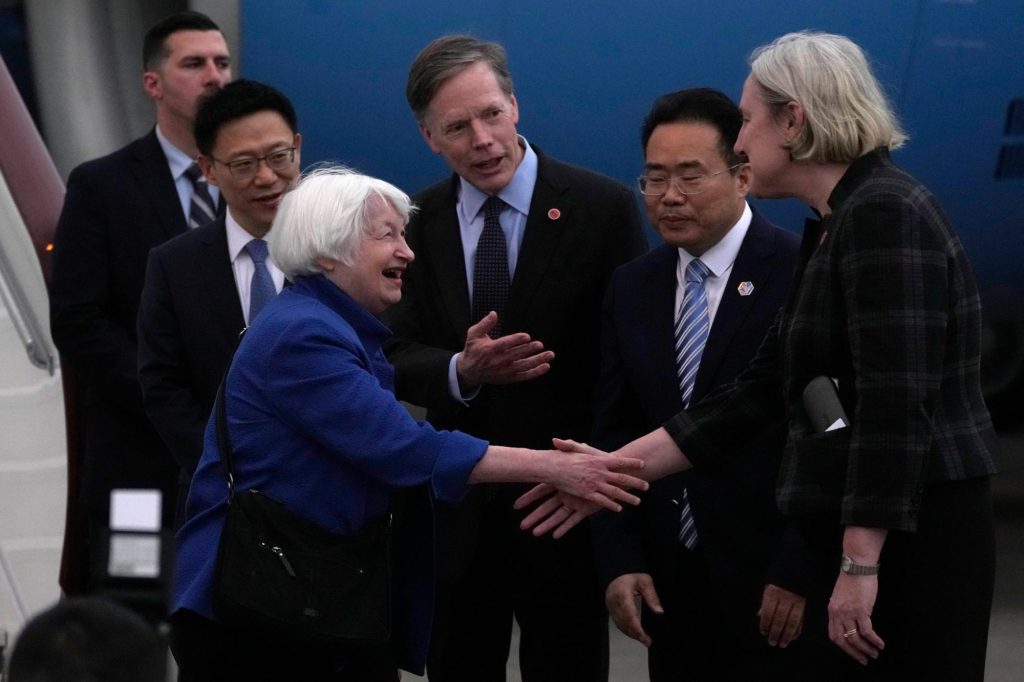By FATIMA HUSSEIN (Associated Press)
Treasury Secretary Janet Yellen has arrived in China for a series of meetings focused on avoiding conflict with the US, but the two largest economies are still figuring out how to compete with each other.
Tensions exist over Chinese government support for producing electric vehicles and solar panels, as the US government also supports these tech sectors. Trade differences, TikTok ownership, access to computer chips, and national security are all risks to the carefully managed relationship.
Yellen, a 77-year-old renowned economist and former Federal Reserve chair, outlined the issues she plans to discuss with Chinese officials during her visit. She will meet with finance leaders, state officials, Vice Premier He Lifeng, Chinese Central Bank Governor Pan Gongsheng, former Vice Premier Liu He, US business leaders in China, university students, and local leaders.
During a stop in Alaska, Yellen stated that her visit continues the dialogue that began after US President Joe Biden and Chinese President Xi Jinping met in 2022. She mentioned it would be her third meeting with China’s vice premier.
Yellen recently accused China of flooding global markets with heavily subsidized green energy products, possibly undercutting US subsidies to its renewable energy and EV sector. She plans to share her concerns with Chinese officials about flooding the global market with cheap solar panels and EVs that hinder other countries' development in those sectors.
Yellen told reporters, “We need to have a level playing field. We’re concerned about a massive investment in China in industries that’s resulting in overcapacity.”
Yellen did not rule out taking additional steps to counter Chinese subsidies in the green energy sectors, stating, “Quite a few countries, including Mexico, Europe, Japan, are feeling the pressure from massive investment in these industries in China.”
The Treasury secretary’s travels follow Biden and Xi's first call in five months, focusing on Taiwan, artificial intelligence, and security issues.
The call, described by the White House as “candid and constructive,” was the leaders’ first conversation since their summit in November, which improved military ties and cooperation on stemming the flow of deadly fentanyl and its precursors from China.
Yet, it seems challenging for the two countries to find a balance between competition and hostility.
For example, Xi recently entertained American CEOs in Beijing to attract them to invest in China. Meanwhile, Biden last August issued a directive to a committee, led by Yellen, to closely monitor U.S. investment in China related to high-tech manufacturing.
Jude Blanchette, a China expert at the Center for Strategic & International Studies, stated, “the Biden administration’s efforts over the last year to stabilize the relationship are clearly working, but the main friction points all remain unresolved and will likely challenge the relationship for the foreseeable future.”
“For the time being, a ‘managed rivalry’ might be the best we can hope for, given the potentially catastrophic consequences of the relationship really going off the rails,” he said.
Yellen mentioned last week that China is oversaturating the market with green energy, which “distorts global prices,” and plans to inform her counterparts that Beijing’s increased production of solar energy, electric vehicles and lithium-ion batteries poses risks to productivity and growth to the global economy.
More than twenty years ago, China began to expand its presence in the global economy by exporting inexpensive goods that appealed to U.S. consumers at the expense of factory jobs in many of those consumers’ hometowns. Research by economists David Autor, David Dorn and Gordon Hanson on the “China Shock” led to the gradual decline of many factory towns, and in some cases led to greater political dissatisfaction.
Nevertheless, some experts believe that an economic showdown to produce green products could be beneficial.
Shang-Jin Wei, a professor of Chinese business at Columbia University, suggests that a subsidy war could ultimately help consumers in both countries purchase more climate-friendly products, which is a goal of the Biden administration.
“In contrast, a U.S. tariff on EV imports could raise the price of EVs in the U.S. and is therefore counterproductive for the purpose of inducing a green transition.”
Yellen’s trip will run from April 4 to 9. It’s intended as a follow-up to Yellen’s travel to China last July, which resulted in the launch of a pair of economic working groups between the two nations’ finance departments to ease tensions and deepen ties.
But this visit falls in an election year, where tough talk on China has increased by Democrats and Republicans — who criticize Chinese ownership of popular social media app TikTok, the nation’s censorship and human rights record and hold a deep mistrust over recent acts of espionage such as hacking and the use of a spy balloon.
Scheherazade S. Rehman, a professor of International Business and Finance and International Affairs at George Washington University, mentioned while “it’s an election year, so all the rhetoric is going to be sharper, the U.S and China are in a symbiotic trading relationship and ultimately need each other.”
China is one of the United States’ biggest trading partners, and economic competition between the two nations has increased in recent years. Yellen stressed Wednesday that the United States has no interest in decoupling from China.
China is helping Russia with its invasion of Ukraine, which will be discussed at the meetings. While the U.S. and its allies impose sanctions on Russian officials and key parts of the Russian economy such as banking, oil production, and manufacturing, trade between China and Russia is growing.
___









